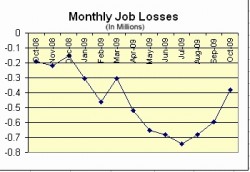 October pulled a trick on economists who had expected the U.S. would be treated to a slowing job loss. Instead, the Bureau of Labor Statistics said this morning that 190,000 jobs were lost during the month, helping push the unemployment to a surprising 10.2 percent.
October pulled a trick on economists who had expected the U.S. would be treated to a slowing job loss. Instead, the Bureau of Labor Statistics said this morning that 190,000 jobs were lost during the month, helping push the unemployment to a surprising 10.2 percent.
Surveys of economists had predicted the numbers would be closer to 150,000 to 175,000 lost jobs and an unemployment rate of 9.9 percent. The spike pushed the unemployment rate to its highest point since April 1983 and the job loss was the 22nd consecutive month of declines.
The largest losses were in construction, manufacturing, and retail trade. The three sectors and finance are responsible for the biggest share of job losses since the recession officially began in December 2007. Construction alone has lost 1.6 million jobs. Manufacturing has lost 2.1 million.
The rate of job losses is well off its highs from earlier this year, some of it due to government stimulus efforts. But the numbers still portend a slow recovery for the labor market.
With the latest numbers, the government says 15.7 million are unemployed. An additional 11.7 million people are working part time because they can’t find full-time jobs or had given up searching for at least the four weeks before the survey period.
Unemployment, however, is not evenly spread across the labor force. It’s worst for teenagers who are part of the labor force, at 27.6 percent, and lowest — 4.7 percent — for those 25 and older with at least a four-year college degree.

Other indices, including the Monster Employment Index, showed little movement. Consumer Confidence, which had improved in the last few months, declined, as did the number of new jobs posted online.
In Canada, the jobless rate hit 8.6 percent as employers there cut 43,000, surprising labor market forecasters who were expecting a gain of 10,000 jobs.
Sal Guatieri, a senior economist at BMO Capital Markets in Toronto, told Bloomberg.com, that the report was a “big disappointment.” “Our economy seems to be struggling out of the recession and the weak employment just fits into that trend.”
Another economist, speaking about the U.S. job outlook, but who could just as well have been talking about Canada, too, told BusinessWeek: “This recovery is shaping up to be a jobless one, just like the last two.”
Added Paul Ashworth, an economist with Capital Economics in Ontario, “Our concern is that, unlike the last recovery, with credit still tight, households aren’t going to be able to smooth their consumption using credit until the labor market eventually strengthens.”